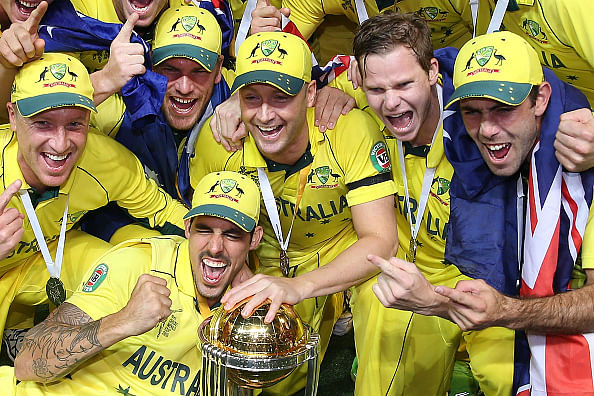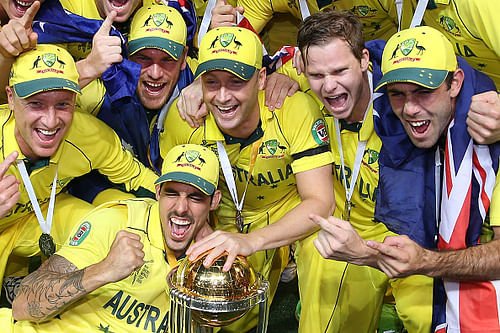
Australia are champions again, but why is the rest of the world so upset?

Has there ever been a set of champions more hated than the Australian cricket team? I’ve been trying to think of a single time in my cricket-watching history when a majority of the people around me weren’t rooting vociferously against Australia in a match, and I’m drawing a blank. The Aussies are always the villains, always the lowlife brutes, always the nasty bullies whose asses everyone wants to get kicked.
But success, especially of the persistent kind that the Men from Oz have become accustomed to achieving in cricket, has a way of making you look for answers beneath the surface. Today, as Michael Clarke’s team jumped about in ecstasy after crushing New Zealand for their fifth World Cup trophy, it was hard not to wonder whether they really deserve the flak that they so unfailingly receive from all corners of the globe.
No, winning doesn’t make everything okay. It wouldn’t be right to give the Aussies a pass just because they are so darned good at what they do. But are they really that bad at the things they aren’t good at?
They sledge the opponents like there’s no tomorrow, that’s true. But think about this objectively: which team doesn’t? Players like Dale Steyn and Kieron Pollard have verbally roughed up more than their fair share of opponents over the years, and even Indians are not Messrs Goody two-shoes any more – the likes of Virat Kohli and Rohit Sharma have put paid to that notion. None of these upright gentlemen, however, cop even half the flak that those boorish Aussies do, despite committing virtually the same transgressions.
Yes, the Australians do it with greater frequency and intensity than the other teams. And while the rest of the team might still be tolerable, Brad Haddin, with his incessant appealing and snarky send-offs to the dismissed batsmen, makes himself look like a Class A jerk. But who’s to say just ‘how much’ sledging is acceptable? Who draws the line that separates light-hearted banter from vicious, disgusting, personal attacks? A sin is a sin irrespective of its magnitude; Clarke’s band of bandits may not be the most sweet-tongued bunch of angels, but the rest of the cricketing community aren’t saints either.
Off the field, players from all the teams have a fine camaraderie with each other, or at least they seem to. David Warner, Mitchell Starc and Glenn Maxwell share the same dressing room with their Indian counterparts while playing the IPL, and they get along famously well. The players don’t seem to mind the Aussie brand of in-your-face aggression, even if the fans think it is a disgrace to the game of cricket.
Of course, if you’re talking about the IPL, the fans don’t seem to mind any kind of sledging there. You’ll rarely see Indians going up in arms if Mitchell Johnson turns on the offense (either with the ball or with his verbal volleys) when dressed in Kings XI Punjab colours.
One reason why Australian sledging is met with more revulsion than any other kind of sledging could be the fact that the Aussies are so open about it. Ever since Steve Waugh went public with his view that trash talk is a part of the ‘mental disintegration’ that his players like to inflict on their opponents, a palpable sense has spread among the masses that the Aussies depend on sledging to win matches.
But that, like most public perceptions, couldn’t be further from the truth. The Aussies win matches because of their superiority in skill and athleticism, and not because they can make their opponents want to cover their ears in alarm. If sledging helped them dominate their opponents, Rahul Dravid would never have scored 233 in that famous Adelaide win, nor would Kohli have racked up four centuries in the recent four-match Test series.
The team that won the World Cup today would likely have won it even without a single word uttered on the field of play. In Mitchell Starc and Mitchell Johnson, the Aussies have two of the five best fast bowlers of this generation. In Steven Smith they have perhaps the most incredibly versatile batsman on earth this side of AB de Villiers. In Glenn Maxwell they have the most fearless striker of the cricket ball, who also possesses a pure sense of timing to go with that fearlessness. In James Faulkner they have probably the greatest No. 8 batsman in the history of the one-day game.
And in Michael Clarke, they have a leader who knows the best possible way to make a statement. Having announced on Friday that he would retire from ODIs after the final, Clarke was even more inspired in the field today than usual, effecting some brilliant bowling changes and field placings to choke the life out of the New Zealand batting. But when he arrived at the crease, he was greeted with some remarkably suffocating fields himself, which almost seemed to mock Clarke’s place in the team. That reminded me of the time during the last Ashes when the English gave singles to the batsman at the other end to get Clarke on strike, taunting him for his supposed inability to play the short ball – the way you would taunt a tailender.
Both times, Clarke responded with something that was a mix of gumption, arrogance and delightfully skilled batsmanship – he took the attack to the bowlers, crafting match-winning knocks to take his team home. By refusing to cow down in the face of an onslaught, Clarke embodied the typical Aussie sporting spirit – take whatever is thrown at you, and respond with something even more forceful, aided and abetted by the abundant skill that you are blessed with.
This might sound like a stretch to some, but the Australian brand of all-out aggression (which includes pissing all over their struggling opponents) might actually be one of the reasons why they are so difficult to beat. Think about how an Australian success story is always reported; the team is usually described with adjectives like ‘ruthless’, ‘merciless’, ‘brutal’, ‘relentless’ and ‘ferocious’. Now think about this: have you ever come across a person in your day-to-day life who is both gracious and merciless?
As much as we’d like to believe in an ideal world where alcohol doesn’t give you a hangover and puppies are the masters of everything, nice guys usually aren’t winning machines. Serena Williams, Cristiano Ronaldo, Michael Jordan – the sports world is filled with examples of champions who dip into the well of arrogance far more often than we’d like them to; these legends play with an intensity that is so cut-throat that it comes off as unsportsmanlike (even if it technically isn’t).
To be the best, you have to truly believe you’re the best. And when you truly believe something like that, when you’re constantly working your ass off trying to be perfect in every aspect of your game, being nice to your less successful peers is a tremendously hard thing to do.
There are exceptions to this, of course; people like Rafael Nadal, Sachin Tendulkar and Lionel Messi never cease to amaze with their borderline unreal humility, undimmed by the mountain of accomplishments and trophies by their bedside. But the rest of the mortal world? Being good in the field is hard enough; expecting them to also be polite while doing their thing is expecting too much.
Through all the years of hate that the Australian team has had to face, one thing has remained constant: they don’t seem to give two hoots about it. They keep making the same arrogant statements to the press, and they keep trying to get under the skin of their opponents one way or another. But why would you care about how much you are loved by the people, when you can rub your trophies in their faces and gloat about your never-ending successes?
It feels a little strange that I am trying to defend a team that has just won its fifth World Cup trophy (when no other team has won more than two), and fourth out of the last five editions. But I also realize that this team doesn’t really need defending. The Australians have put together a winning culture in cricket that has perhaps no parallel in all of sport, and if the rest of the world can’t acknowledge and appreciate that, so be it.
The haters can keep hating, but that won’t stop the Australians from winning.